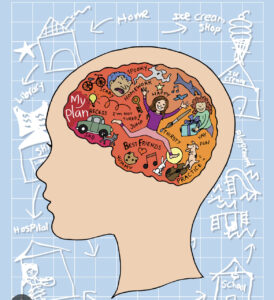“Rubbing My Head” (#Dyslexia #ADHD #Whatever)
 This blog can occasionally serve as a bit of a confessional, providing me with a forum to voice some concerns regarding the issues that emerge while working with struggling children and their parents.
This blog can occasionally serve as a bit of a confessional, providing me with a forum to voice some concerns regarding the issues that emerge while working with struggling children and their parents.
So, with that in mind here’s a confession.
Sometimes I honestly don’t know when a child’s struggling, particularly in the four to seven-year range (Pk-1st) is related primarily to immaturity (i.e., they are not ready and need more time) or whether their struggling represents a legitimate disorder/disability.
(As I write this, I hear the chorus in the back of my mind calling out.)
“Well, Mr. Big Shot. You’re the doctor. That’s why we are coming in to see you – to tell us what it is. What do you mean you are not sure if it’s immaturity or a disorder? Stop rubbing your head! What’s the matter with you???”
I try talking back to the chorus.
I tell them things like, “It’s rarely clear cut. There is usually a ‘pie chart or ‘soup pot’ of variables interacting.’”
At that point the chorus gets louder. They are almost screaming, “‘A soup pot of variables!!!!!’ What does that mean??? Does she have it or not? Does she have dyslexia??? And what about ADHD? She pays attention to nothing!!!! Isn’t that ADHD? And she seems awfully anxious. Come on, man. Get out of your soup pot.”
Relentlessly badgered by the chorus, I think of Marjorie, age 7, a child I recently evaluated who doesn’t read very well or stay on task without a lot of reminders.
Marjorie’s teacher vaguely spoke to the mom about her not paying attention very well in school, with the implied suggestion that she might have ADHD, always with the caveat that “We are not doctors. We don’t diagnose.”
After running Marjorie through a bunch of tests, I had one overall impression.
Marjorie struck me as immature.
“Immature????,” the chorus cries out. “Are you kidding me?”
“Yes,” I push back against the chorus. I tell them that Marjorie seemed more like a five-year old-rather than seven in her manner and way of interacting – that her preoccupations came across as a bit babyish.
The problem with that there is no test to quantify “babyish,” such as a “Maturity-Immaturity Scale.”
It’s the same with the disorders, like dyslexia or ADHD. Even though there are more objective tests involved in the assessment, there is no X-Ray or blood test to say, “Yes, has it” or “No, doesn’t have it.” It’s still a weighing of variables that tilt the scales one way or the other.
Takeaway Point
I am sticking with the view that Marjorie needs time and perhaps some tutoring to help her mature and improve her skills. We need to track and monitor her closely to see how she responds.
“Back down, chorus. I’m going back to rubbing my head.”
To receive future blog posts, register your email: https://shutdownlearner.com.
To Contact Dr. Richard Selznick for advice, consultation or other information, email: shutdownlearner1@gmail.com.

 Copyright, Richard Selznick, Ph.D. 2023, www.shutdownlearner.com.
Copyright, Richard Selznick, Ph.D. 2023, www.shutdownlearner.com.

 Oliver, age 8, has difficulty behaving in his third grade class.
Oliver, age 8, has difficulty behaving in his third grade class. Parents commonly come in with common questions such as, “Does their child have ADHD?” or “Is my child dyslexic?”
Parents commonly come in with common questions such as, “Does their child have ADHD?” or “Is my child dyslexic?” Synonyms for “nonchalance:” apathy, complacence, indifference, unconcern, torpor
Synonyms for “nonchalance:” apathy, complacence, indifference, unconcern, torpor An issue often overlooked with children diagnosed as ADHD is a frequently occurring underlying variable of social judgment and difficulty with “reading” cause and effect. Difficulty with reading cause and effect impacts both social and academic functioning, such as understanding inferences with reading comprehension.
An issue often overlooked with children diagnosed as ADHD is a frequently occurring underlying variable of social judgment and difficulty with “reading” cause and effect. Difficulty with reading cause and effect impacts both social and academic functioning, such as understanding inferences with reading comprehension. Largely supported by the medical model, when parents have their child assessed they are often focused on “the diagnosis.” Such a model embodies a, “Yes, they have it,” or “No, they don’t have it,” (whatever “it” is) perspective.
Largely supported by the medical model, when parents have their child assessed they are often focused on “the diagnosis.” Such a model embodies a, “Yes, they have it,” or “No, they don’t have it,” (whatever “it” is) perspective. A common concern raised by parents (well, mostly the moms) is their child’s lack of what they label as “executive function deficits (EFD).”
A common concern raised by parents (well, mostly the moms) is their child’s lack of what they label as “executive function deficits (EFD).” As noted in the previous blog, with children showing challenging behaviors causing you tremendous stress, you were encouraged to adopt a mantra helping you remain in your center, as you speak one “Didja” (e.g., “Didja you do your homework?”) after another.
As noted in the previous blog, with children showing challenging behaviors causing you tremendous stress, you were encouraged to adopt a mantra helping you remain in your center, as you speak one “Didja” (e.g., “Didja you do your homework?”) after another. Copyright, Richard Selznick, Ph.D. 2023, www.shutdownlearner.com.
Copyright, Richard Selznick, Ph.D. 2023, www.shutdownlearner.com. Following up on last week’s Selznick Poll discussion on what percentage of boys show signs of “executive function” deficits (click here:
Following up on last week’s Selznick Poll discussion on what percentage of boys show signs of “executive function” deficits (click here: